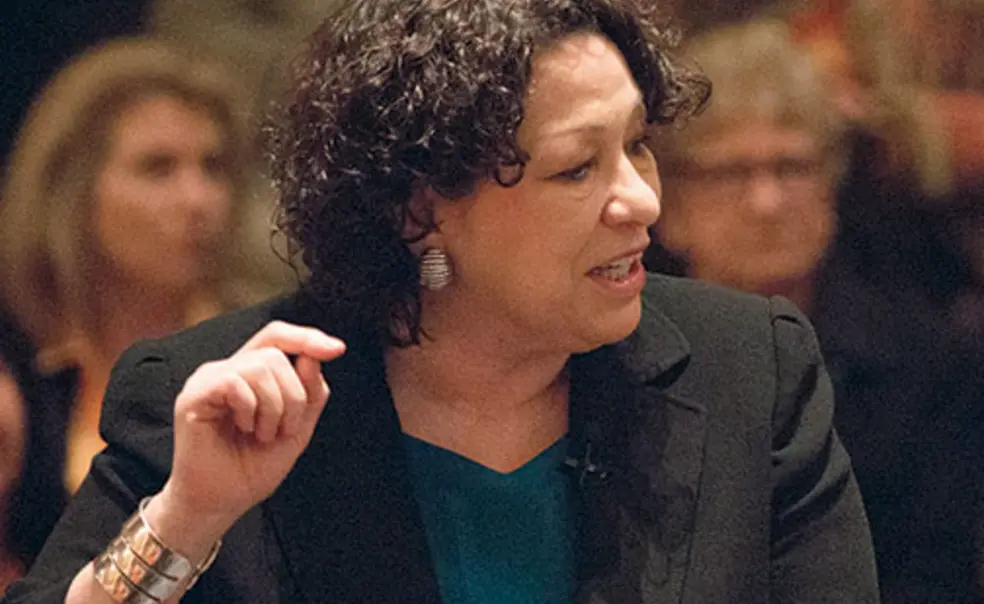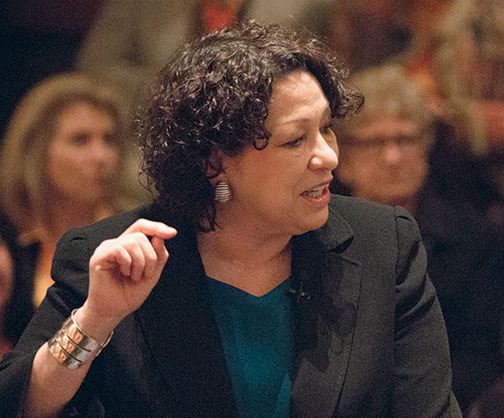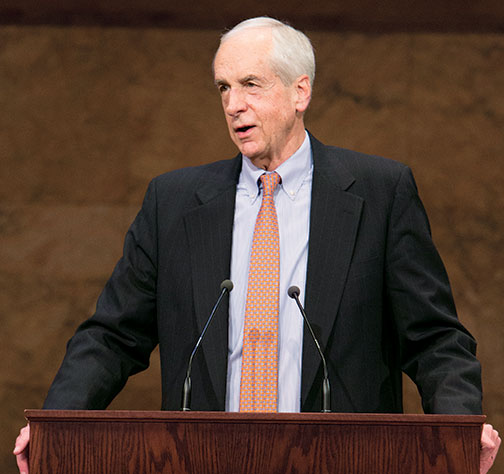Alumni Day: ‘In the Service of Humanity’
Honorees Sotomayor ’76 and Rawlings *70 speak on service and higher education
Supreme Court Justice Sonia Sotomayor ’76 called for a broader definition of service in her Alumni Day address Feb. 22. Taking as her theme “In the Nation’s Service,” the title of Woodrow Wilson 1879’s address at Princeton’s sesquicentennial celebration in 1896, Sotomayor said, “I live with Princeton’s motto in my heart, as you do, because it was emblazoned there during our time here.”
Even before she spoke, Sotomayor, who received the Woodrow Wilson Award, the highest award for an undergraduate alum, was given a standing ovation by the orange-and-black-clad crowd — including a large number of children — that packed Richardson Auditorium.
Sotomayor said she learned much about the value of public service as an undergraduate, citing her involvement in student organizations and as a volunteer at Trenton Psychiatric Hospital. She described the concept of service as “multidimensional.”
“It is not just a professional pursuit,” the justice said. “It is about the relationships we build with families, friends, and others in our communities. And service also is about our involvement in the world as citizens and voters, and as participants in our civic society.”
Drawing heavily on stories from her 2013 memoir, My Beloved World, Sotomayor cited her own mother, who missed watching the Senate vote on Sotomayor’s nomination to the U.S. Court of Appeals because she was taking a sick neighbor to a doctor. “Not everybody can be president of the United States or a Supreme Court justice,” Sotomayor said, “but everyone can approach their daily work with a passion for making a difference.”
In this light, she suggested that Wilson’s motto might be expanded again to read: “Princeton in the nation’s service, and in the service of all nations, and in the service of humanity, one person and one act at a time.”
Even today, despite the demands on her time, Sotomayor said she tries to do volunteer work: “It is so important to squeeze out time from our overwhelming professional commitments to remember we need to serve people, not just institutions.”
Each night before she goes to sleep, Sotomayor said, she asks herself two questions: First, have I helped someone today? Second, what have I learned today? She reminded the audience that it is possible to do good even when one’s efforts do not bear fruit, saying, “We can serve society not only in the smallest of our successes, but in our failures.”
In what may have been an Alumni Day first, Sotomayor left the podium after her address to take questions while roaming the audience and posing for pictures. She responded warmly to everyone. When a 7-year old girl in the balcony asked Sotomayor if she enjoyed serving on the Supreme Court, she replied, “I love being a justice. I get to meet people like you.”
In response to a student who spoke about Latino student groups, Sotomayor urged him to learn about other cultures as well as his own. “Don’t leave this university until you have explored the world of your classmates,” Sotomayor told him. “You can’t change the world unless you understand it.”
Sotomayor’s talk followed an address by Hunter R. Rawlings III *70, the president of the Association of American Universities and winner of the James Madison Medal, Princeton’s highest honor for a graduate alum. (PAW plans to publish an excerpt of Rawlings’ talk in the April 2 issue.) A classics professor and former president of Cornell University and the University of Iowa, Rawlings amused the audience by explaining that the title for his lecture, “The Lion in the Path,” had been provided by his undergraduate Latin professor, who assured the students that it was perfect for addressing large audiences because it sounded impressive but meant nothing, thus assuring maximum rhetorical flexibility.
Rawlings, however, had a serious message to deliver about “the lion in the path” of higher education. He cited four factors that have contributed to the excellence of the American higher-education system: academic freedom, a diversity of institutional sizes and structures, strong graduate programs and federally supported research programs, and an emphasis on individual instruction and intellectual inquiry.
Despite these strengths, Rawlings said, higher education has come under attack by politicians and many in the public. He acknowledged problems in how universities are run, citing in particular the rising “monster” of intercollegiate athletics, which threatens to turn a university into a “gigantic entertainment business.” He also decried the recent trend toward evaluating the quality of education by trying to measure outcomes, whether that is the amount of research funding a faculty member brings in or the average starting salary of undergraduates. Rawlings quoted Albert Einstein’s observation that “not everything that can be counted counts, and not everything that counts can be counted.”
Despite the challenges to higher education, Rawlings remains optimistic. “U.S. colleges and universities have never been in so much demand and have never been ranked more highly internationally,” he said.
In addition to the lectures by Sotomayor and Rawlings, Alumni Day offered an array of events. Among them were a lecture on the space race and lunar missions by professor of mechanical and aerospace engineering Robert Stengel *65 *68; a panel discussion on the diversity of Princeton students; and the Service of Remembrance honoring deceased alumni, students, and University faculty and staff members. Alumni volunteers and student winners of the Pyne Honor Prize and the Jacobus Fellowships were recognized at the annual luncheon in Jadwin Gymnasium (see page 42).
This was the first Alumni Day to be presided over by new president Christopher Eisgruber ’83, who was joined at the morning lectures by his three living predecessors, Shirley Tilghman, Harold Shapiro *64, and William Bowen *58.














No responses yet